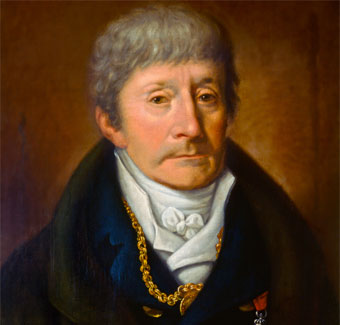Salieri gets his due with the Commonwealth Chorale’s excavation of his Requiem

Antonio Salieri’s Requiem in C Minor was performed by the Commonwealth Chorale Sunday in West Roxbury
Sunday afternoon’s concert by Commonwealth Chorale under its director David Carrier offered music from composers often obscured by their historic colleagues. Performed at Church of the Holy Name in West Roxbury, the aptly titled program “Out from the Shadows” began with Salieri’s Requiem in C Minor.
Far from the bitter hack depicted in the filmAmadeus, Salieri was actually a popular and respected composer across Europe. His students included Beethoven, Liszt, and Schubert. He was also the longest serving Hofkapellmeisterfor the Hapsburg royal family and enjoyed a stimulating and respectful professional rivalry with Mozart. During a period of depression spurred by one of his few failed operas, Salieri wrote the Requiem in anticipation of his own death (which he recovered from before passing away over 20 years later).
Scored for vocal quartet, chorus, and orchestra, the Requiem’s vocal writing is mostly declamatory, and proved well-suited to Commonwealth Chorale’s clear diction and even balances. The chorus was by turns powerful and sensitive, and the Introit was foreboding yet beautiful. “Quantus tremor est” built into an ominous foretelling of the final judgment, while one could feel pages in the book of final judgment turning in “Liber scriptus proferetur.”
This mass’s atmosphere is often dark. Carrier’s measured conducting intensified the threatening moments while making hopeful ones unfold gracefully. The Offertory, with brass and percussion, had a palpably martial feel while “Agnus Dei” resounded with gratitude and affection for the savior. Carrier’s dynamic shaping, as in an ethereal “Lux aeterna luceat eis” and well-choreographed crescendos throughout the piece, further illuminated Salieri’s craftsmanship.
The vocal quartet’s entrance midway through the Sequence resembles the rays of Heaven peeking through the haze of death. Salieri’s contrast between chorus and quartet, darkness and light, was all the more effective given the bright, transparent sound of the quartet: soprano Celeste Godin, mezzo Vera Savage, tenor Gregory Zavracky, and baritone Thomas Jones.
The Requiem also includes a prominent part for English horn, to which Laura Pardee Schaefer brought subtle phrasing and lyricism. The brass commentary in “Tuba mirum” was understated but chilling, and Gary DiPerna’s timpani boomed with the gravity needed for Salieri’s sterner moments.
The concluding “Libera Me” is sung in a monosyllabic, almost chant-like style, accompanied by just winds doubling the parts. It is a stark but ultimately peaceful effect, given an air of comforting spirituality by this chorus.
The second half of the program featured Kuhnau’s Magnificat in C Major, for five vocal soloists, chorus, and orchestra. Kuhnau was Bach’s predecessor as Thomaskantor in Leipzig and an admired composer for the keyboard (as well as a successful lawyer, scholar, and novelist). The event that inspired this Magnificat is unknown, but the work points to another composer worth exploring in greater detail.
The Magnificat is a hymn of praise to God, and Kuhnau’s setting is as joyous as Salieri’s Requiem is solemn. Its vocal writing is ornate without obscuring the text. Contrapuntal layering of choral sections in “Quia fecit mihi magna” audibly magnifies the singers under God. Kuhnau’s orchestration is also quite colorful. The titular opening movement immediately soars into strings, woodwinds and trumpets, followed by “Et exsultavit spiritus meus” with obbligato oboe dancing a siciliano behind the soprano soloist.
The orchestra and chorus shined from the outset, and Jennifer Slowik’s oboe perfectly matched Godin’s soprano. Occasional misbalances between the orchestra and the chorus and weak choral entrances did appear, noticeable only next to the high bar set by the concert’s first half.
Carrier’s moderate tempos made for a reverent sense of joy rather than outright merriment.Savage sang “Quia respexit humilitatem” with poised humility, while Zavracky brought a plaintive tone and intimate blend with the strings in “Et misericordia eius” and “Suscepit Israel.”
Jones sang the fast-paced “Gloria Patri” with an agile, silvery baritone.Soprano Sarah Schwartzer joined the soloists for the Magnificat, and her voice created asimply gorgeous upper register duet with Godin on “Sicut locutus est.”
“Sicut erat in principio” featured the five soloists weaving in and out of one another’s lines before another grand tutti closed this concert of rarities performed with the energy and nuance of established masterpieces.
Commonwealth Chorale will perform Menotti’s The Unicorn, The Gorgon and The Manticore as well as Randall Thompson’s Frostiana 8 p.m. Saturday, May 11 at Second Church in Newton. commonwealthchorale.com; 617-527-7464
Posted in Performances
Posted Mar 12, 2019 at 8:43 am by Wayne Perkins
I very much enjoyed this concert, and I think Andrew Sammut’s review is excellent. I would call the listener’s attention to the excellent though underappreciated Commonwealth Chorale. In the busy Choral Society environs in the greater Boston area, don’t overlook this very good one.